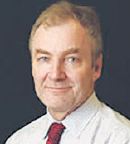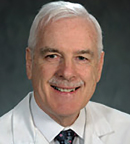The COVID-19 pandemic transformed cancer care, seemingly overnight, as practices scrambled to ensure a safe environment for caregivers and patients. Although regulatory burdens have been relaxed to allow patients to continue on trial treatment and telemedicine has expanded its competency and reach, there has been a significant decline in accruals to clinical trials across the country.

Charles D. Blanke, MD

Walter J. Curran, Jr, MD, FACR, FASCO

Peter J. O’Dwyer, MD
The ASCO Post asked the chairs of three National Cancer Cooperative Groups participating in the National Cancer Institute (NCI) National Clinical Trials Network (NCTN) to discuss the impact of the crisis on current and future clinical research and the changes they hope carry over to a world beyond COVID-19. Charles D. Blanke, MD, Professor of Medicine, Knight Cancer Institute, Oregon Health & Science University, serves as Group Chair of SWOG Cancer Research Network. Walter J. Curran, Jr, MD, FACR, FASCO, Executive Director of the Winship Cancer Institute of Emory University, serves as a Group Chair of NRG Oncology. Peter J. O’Dwyer, MD, of the University of Pennsylvania and the Abramson Cancer Center, serves as Co-Chair of ECOG-ACRIN Cancer Research Group.
‘Undeniable’ Impact on Accrual
As Dr. O’Dwyer explained, for many patients with cancer, entry on clinical trials often represents optimal therapy or the chance to access a promising treatment. Although ECOG-ACRIN and other NCTN groups have made it “an important priority” to keep new trial development and ongoing trials open, there’s no denying the impact on accruals. For Dr. O’Dwyer, the trajectory of this impact was most visible in the last 2 weeks of March, where accrual for therapeutic trials fell approximately 50%, depending on the group.
Because they enroll a healthier patient population, the decline in accrual for screening trials was even more dramatic. According to Dr. Curran, nontherapeutic trials, which include screening, population science/epidemiology, and symptom management trials, have stopped enrolling since the COVID-19 pandemic. Conversely, enrollment in therapeutic trials for NRG Oncology is down approximately 30% to 40% compared with the weeks and months before COVID-19.
“Considering there are some institutions that have stopped offering enrollment on trials altogether due to the complexity of the challenges they’re facing, we view maintaining enrollment at those levels as an accomplishment,” Dr. Curran said.
Although SWOG has not had to suspend any trials, Dr. Blanke reported that accrual has dropped by approximately one-third on intervention trials and up to 22% on screening trials. Population science trials, on the other hand, have been hit much harder, he added, with accrual falling up to 80% in some groups.
Each Tumor Type: A Different Story
Dr. Blanke reported differences in accrual by tumor type. For SWOG, the largest decreases have come in breast cancer and gastrointestinal malignancies, whereas there has been less of a decline in genitourinary cancer, lung cancer, and subsets of lymphoma. “Our Hodgkin’s trial continues to do extremely well, and it is not fully clear what makes this study so different,” admitted Dr. Blanke.
Dr. Curran emphasized that each tumor type is a different story with respect to accruals. For men with early-stage prostate cancer and women with very early–stage breast cancer, he said, a group of international experts have published guidelines on whether a delay in the start of therapy or in staging for a few months might be acceptable. For aggressive cancers, on the other hand, most groups have done their best to provide time-sensitive care.
“Emory is no different from many major academic medical centers in that we’ve had to prioritize among necessary surgical procedures because of the need for ICU beds and ventilators,” said Dr. Curran. “Because we’ve established an excellent process of defining time-sensitive surgery, we’ve been able to provide surgical care to our patients with cancer.
Not All Phases Affected Equally
The groups also reported that not all clinical trial phases have been equally affected, with phase I trials experiencing the biggest drops in accruals. According to Dr. O’Dwyer, the trials remaining open are those that demonstrate “clear promise.” He continued, “Phase III trials, where the benefit of the trial is much clearer to both physicians and patients, have been less impacted in my view. On the other hand, trials that feature novel agents have decreased significantly in their recruitment because the promise is less well characterized.”
Dr. Blanke noted differences in accrual patterns and added that many institutions are abiding by the so-called immediate benefit rule. “You’re not allowed to see patients for research purposes unless you can promise them an immediate benefit from treatment,” he explained. “Any trial with a control or placebo arm violates that rule enough that several of our centers are not allowed to see those patients anymore [at this time].”
Protocol Deviations and Reliability of Results
As Dr. O’Dwyer reported, the U.S. Food and Drug Administration (FDA) loosened many of its requirements for clinical trials early on in the COVID-19 pandemic, recognizing that patients on study might not be able to complete all testing, might experience delays in testing, or might need to be evaluated remotely by their treating physicians. “[The FDA has] had a flexible perspective, asking only that we record the deviations to protocol,” said Dr. O’Dwyer. “Consequently, the Cancer Therapy Evaluation Program and the cooperative groups have put together recommendations for how such recording should be done and how we should track the conduct of studies on clinical trials.”
According to Dr. O’Dwyer, recording these deviations should enable investigators to understand their impact on study outcomes while protecting patients on clinical trials. “Our patients’ safety comes first,” he stressed. “If a visit to the hospital has a risk/benefit that is not in the patient’s interest, then we try to do things remotely as much as possible.”
Although the safety readout from the study is paramount, there are many ways to record these data points, he said. However, the timing of scans can be critical to the evaluation of endpoints. “When studies are ultimately analyzed, we may see an effect from these deviations, but we must maintain a balance between the goals of the study and the need to protect patients,” said
Dr. O’Dwyer.
Dr. Blanke noted 19 protocol changes across all of SWOG, including extended windows for CT scans and pausing radiation therapy when not “absolutely vital.” Certain changes, such as allowing the administration of quality-of-life questionnaires over the phone instead of in the clinic, have actually improved the patient experience, he said, and should have been done regardless of the pandemic. “I have no idea why we weren’t doing some of these things to begin with,” said Dr. Blanke.
Dr. Curran underscored that cooperative groups are doing all they can to preserve the reliability of results, but the interpretability of data may depend on the nature of the trial. Nevertheless, the only way to make progress against cancer is to continue this work, he said.
Trial Development ‘Busier Than Ever’
Ongoing trials may be in flux, but the future of clinical research is secure for the time being. All three group chairs spoke passionately about conceptual development being more robust than ever, with a multitude of wide-ranging ideas for studies being proposed and debated amid packed agendas.
“Being in one place has a marvelous way of focusing the mind,” said Dr. O’Dwyer, in reference to the stay-at-home orders. “There are a lot of creative people in the cooperative group proposing studies, and these ideas are being brought forward to the NCI committees.”
Dr. Blanke noted that SWOG’s semiannual meeting, which was recently conducted virtually, featured 10 new concepts for gastrointestinal research alone. The ideas put forth in weekly committee review meetings ranged from assessing patient reimbursement on clinical trials to the use of new immunomodulatory agents to radiomics. Although the activation of new trials by the NCI may be currently delayed, he expressed confidence trials would make a swift recovery. “When the COVID-19 situation lifts, we’ll get back up to speed quickly,” he predicted.
Dr. Curran agreed. “The good news is we’re continuing to keep clinical trials as integrated a part of cancer care as possible,” he said.
Patients With Cancer and COVID-19
The cooperative groups are also utilizing their infrastructure to perform COVID-19 studies, especially for patients with cancer. ECOG-ACRIN and a consortium of cancer centers are exploring whether immunotherapy, radiation therapy, or chemotherapy lead to increased toxicity or impaired outcomes in the context of a COVID-19 infection.
“This question requires numbers to assess, but I think the data will come together in short order to tell us what’s safe and what’s not,” said Dr. O’Dwyer. He noted that several trials have also been initiated to determine whether outcomes in patients with cancer are compromised by the virus.
Dr. Curran noted the creation of registries for COVID-19–positive women with metastatic breast cancer receiving therapy to consolidate knowledge over a larger database. There’s also a group exploring whole-lung radiotherapy to treat COVID-19-positive patients with pneumonia and no malignancy based on interesting preliminary data.
Finally, Dr. Blanke reported on the recent internal approval of a trial for a novel agent that could block the cytokine storm in COVID-19 that leads to ventilation and death. “We have this wonderful apparatus that includes more than 13,000 members and 1,300 sites,” he explained “Although this is not a cancer treatment per se, the results of this study are important to patients with cancer. Why not use a parallel infrastructure to the best of our ability?”
Rethinking Established Paradigms
One of the biggest changes to cancer care caused by the COVID-19 pandemic is the emergence of telemedicine. Although not every patient interaction may be suitable for a screen, noted Dr. O’Dwyer, virtual visits will likely remain an integral part of managing cancer long after COVID-19 is gone. “Many patients, particularly those in follow-up, could easily be managed in a 20-minute phone call as opposed to traveling 4 hours to get to a study center to be seen on trial,” he explained.
The changes will not be limited to telemedicine either. According to Dr. O’Dwyer, COVID-19 has caused a number of processes and procedures to be reevaluated.
“When we’re treating patients in the clinic, we look at each procedure and assess its value,” he said. “We should do the same in clinical research with respect to the intensity of some of the testing. Now that processes have been simplified and the regulatory burden has been lightened to an extent, I’m hoping some of the elements that make clinical trials so expensive will be reconsidered.”
One silver lining amid the crisis, according to Dr. O’Dwyer, is that the role of clinical research in our society has never been highlighted in such a dramatic way. “Even though COVID-19 is in the area of infectious disease, the relevance for cancer is unmistakable,” he said. “I find comfort in the fact that patients who have cancer will benefit from the data these clinical trials afford.”
For Dr. Curran, COVID-19 has forced clinicians to rethink established paradigms, including what care can be delayed and what is possible remotely. It’s also strengthened his working relationships. “Our cancer center as well as infectious disease and epidemiology specialists have been working together beautifully as a team, and we want that to continue,” said Dr. Curran.
Finally, for Dr. Blanke, the biggest impact of the COVID-19 pandemic has been positive: forced [regulatory] flexibility and a change in patient-clinician interaction. “It took a little while, but the NCI eventually decided that telemedicine counts. Local physicians are allowed to do study assessments as long as they’re under the guidance of a study investigator, which is huge,” stated Dr. Blanke. “A lot of things that seemed to be locked in bureaucratic stone for decades are suddenly flexible, and I’m grateful for that.”
DISCLOSURE: Drs. Blanke, Curran, and O’Dwyer reported no conflicts of interest.

